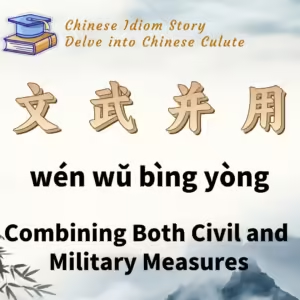
Chinese Idiom: 宽猛相济 (Kuan Meng Xiang Ji)
English Translation: Combining Gentleness and Severity
pīn yīn: kuān měng xiāng jì
Idiom Meaning: This idiom refers to the idea that governance should balance leniency and strictness, using both approaches to effectively manage and serve the people.
Historical Source: The idiom originates from Zuo Zhuan (《左传》), a historical text from the Spring and Autumn period.
Idiom Story:
In the state of Zheng, a prominent reformist politician named Gongsun Qiao (公孙侨), also known as Zichan (子产), served as a significant leader for several decades. He implemented various reforms aimed at strengthening the state, such as targeting the entrenched aristocratic class, promoting loyalty and frugality, opposing extravagance, and regulating the land and military tax systems. His governance improved Zheng’s military power and elevated its reputation among neighboring states.
Zichan once advised the Duke of Zheng, saying, “Only those with virtue can use leniency to win the people’s trust; if one lacks that virtue, they will resort to harsh measures.” He recognized that while enforcing strict laws might be easy, governing with kindness to gain the people’s loyalty was far more challenging.
After Zichan’s death, his successor, Duke Tai Shu (子太叔), adopted a lenient governance style. However, he lacked the wisdom to discern when and how much leniency to apply. As a result, the oppressive forces of the slave-owning aristocracy began to regain power, leading to widespread discontent and rebellion among the people. Duke Tai Shu found himself compelled to use military force to suppress the uprisings, resulting in many casualties.
Upon hearing of these events, Confucius (孔子) from the state of Lu commented, “Well said! When policies are lenient, the people become complacent; to correct this complacency, strict measures must be employed. Conversely, harsh policies will lead to suffering, and after causing many deaths, leniency can be restored. Thus, the balance of gentleness and severity is the ideal approach to governance.”
The story illustrates that effective governance requires a balance between leniency and strictness, where both approaches serve to complement each other. By applying this principle of “宽猛相济,” rulers can effectively manage their states and maintain social harmony.






